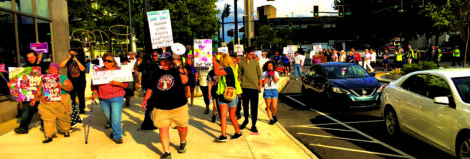Panelists: Resources required to combat human trafficking
It’s difficult to identify and provide resources to victims of human trafficking, advocates and investigators say.
Human traffickers often lure or trap their victims into sex or labor, controlling the vulnerable people with threats, debts, drugs, violence and the promise of a place to stay and a meal to eat, advocates said during a virtual roundtable discussion earlier this month with U.S. Rep. Dave Joyce, R-Bainbridge.
Sting operations — such as the one conducted in the Mahoning Valley this month that led to the arrest of 14 men who sought to engage in sexual activities with children between the ages of 12 to 15 — can take customers who enable sex trafficking out of the community.
But the state still needs more tools to provide the survivors with resources, to track how often the crimes occur and to report and stop the abuses, participants in the discussion said.
The COVID-19 pandemic has limited the amount of training that those fighting human trafficking have been able to give to various groups that are likely to encounter the problem, and seems to have put a damper on how often it is reported — though that does not mean the problem has been reduced.
NUMBER OF CALLS
“We have seen, since COVID hit in the spring, a tiny bit of a slowdown in the number of calls that we’re getting. We don’t have a sense that’s because human trafficking incidents are going down; we think it’s probably even harder now than previously for survivors to reach out for help,” said Sondra Miller, president and CEO of the Cleveland Rape Crisis Center.
The center connects victims to housing, recovery services, food, trauma counseling and assistance with the criminal justice system, since many victims of human trafficking will or have faced criminal charges — one of the things that can make them more vulnerable to trafficking in the first place.
Kalyn Stephens, vice president of government affairs for the American Hotel and Lodging Association, said hotel workers can help report human trafficking, if they are properly trained to identify the signs.
“Human traffickers often rely on legitimate businesses, many in the tourism supply chain, to facilitate their illegal businesses. So we know that the hotel industry is in a critical position to help stop and spot human trafficking. I think given COVID-19, we’ve seen even more of a reason why training every single hotel employee is even more critical than before,” Stephens said.
With many hotels experiencing furloughs, it is crucial the employees that remain are trained to identify the signs and the best way to report it, Stephens said.
SPECIAL TRAINING
Even police officers need specialized training they may not be getting in order to successfully help victims and stop the perpetrators, said Anne Victory, education director for the Greater Cleveland Collaborative to End Human Trafficking.
The group worked with law enforcement to come up with “best practices” when trafficking is suspected, and to educate police officers to look closer at certain situations to identify the problems when they come up in seemingly unrelated calls.
The group, responsible for the creation of anti-trafficking billboards and informational posters, was offering police departments training before the pandemic began and is looking for ways to continue it. The group has reached more than 80 departments so far and wants to keep expanding to other departments and other first responders, Victory said.
There needs to be a standard policy in police departments and formal protocols in health care systems to identify victims and help them out of the situation, she said. Emergency medical technicians, firefighters and school workers also should receive training to help. The training doesn’t only help identify victims but also helps the responders speak to the victims in a way that doesn’t further traumatize them, Victory said.
DIGNITY
“We’re concerned that the victims be treated with respect and dignity and realization of the trauma they have experienced. As professionals, we don’t need to traumatize them more, so how we interact with them is really, really important,” Victory said.
Detective John Morgan with the Cuyahoga County Sheriff’s Office said the region still lacks the resources to take care of children impacted by trafficking.
“I think the biggest deficiency that we overlook is our juveniles,” he said.
It can often be difficult to find a safe place for a survivor to sleep; there aren’t enough places to take child victims and placing them in foster care or juvenile corrections facilities are not good options, Morgan said.
It is important to remember that most victims of trafficking aren’t kidnapped from the grocery store, or a part of some internet conspiracy, the advocates said. The victims are likely to be trafficked by someone they know, after experiencing other forms of sex abuse.




